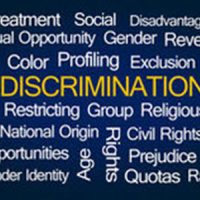Genetic Discrimination at Work is Illegal

We probably can guess the categories where discrimination at work is illegal. Gender, sexuality, pregnancy, age, disability, race or nationality, among others, comes to mind. But many people aren’t aware of another area where it is illegal to discriminate against you at work: based on your genetics.
Examples of Genetic Discrimination
Imagine, for example, a situation where you interview for a job, and your interviewer somehow finds out that you have had many family members stricken by cancer. Your interviewer thinks, “I better not hire this person-I don’t want them out sick with cancer nor do I want to have to make all the accommodations I would have to make for them if they do get cancer.”
Imagine that you tell your boss that you are having a baby, but genetically, there is a chance the baby may be born with a disability. Your boss thinks “I better let them go—I don’t want to deal with all the days off that they would have to take, to care for what may be a sick or disabled child.”
Imagine you get a genetic test and find out you have a high probability of getting Parkinson’s disease, or cancer, even though you’re fine right now. Nonetheless, your boss lets you go because of this information.
These kinds of situations aren’t really disability discrimination under the ADA, or pregnancy discrimination (you aren’t actually disabled or sick yet, as would be required under the ADA), so the worker may have no recourse if the employer discriminates. But it turns out, the worker would have recourse, because of what is known as genetic discrimination.
California’s Genetic Discrimination Laws
Genetic discrimination is illegal under California law, specifically, a law called the Genetic Information Nondiscrimination Act, or GINA.
Genetic discrimination makes it illegal for an employer to discriminate against you, based on your familial history (even if there is no actual genetic data or test), or any medical history in your or a family member’s genetic background, or any genetic medical information that you may learn about yourself.
You also cannot be discriminated against for participating in any genetic testing or clinical studies or trials related to genetics.
What Would Be Considered Evidence of Genetic Harassment or Discrimination?
Isolated “jokes” or one time comments won’t constitute harassment under GINA, but any adverse employment action, such as firing, demotion, exclusion from professional growth or opportunity, or any other negative or adverse employment action, would be seen as discrimination.
In addition to prohibiting harassment or discrimination based on genetics, GINA also prohibits employers from using genetic information in any hiring or employment decisions and prohibits them from intentionally obtaining genetic information (for example, requiring a genetic test as a condition of employment). To the extent genetic information may be acquired by your employer, it must be kept confidential.
Contact the San Jose employment attorneys at the Costanzo Law Firm for help if you are being harassed or discriminated against, because of your family medical history or genetics.
Sources:
fresno.gov/wp-content/uploads/2023/04/Health-Care-Certification-for-Family-Members-Serious-Health-Condition.pdf
sites.uw.edu/phgblog/2021/03/23/the-genetic-information-nondiscrimination-act-allows-for-too-much-discrimination/
mydoctor.kaiserpermanente.org/ncal/Images/GEN_Genetic-discrimination_tcm63-18470.pdf
